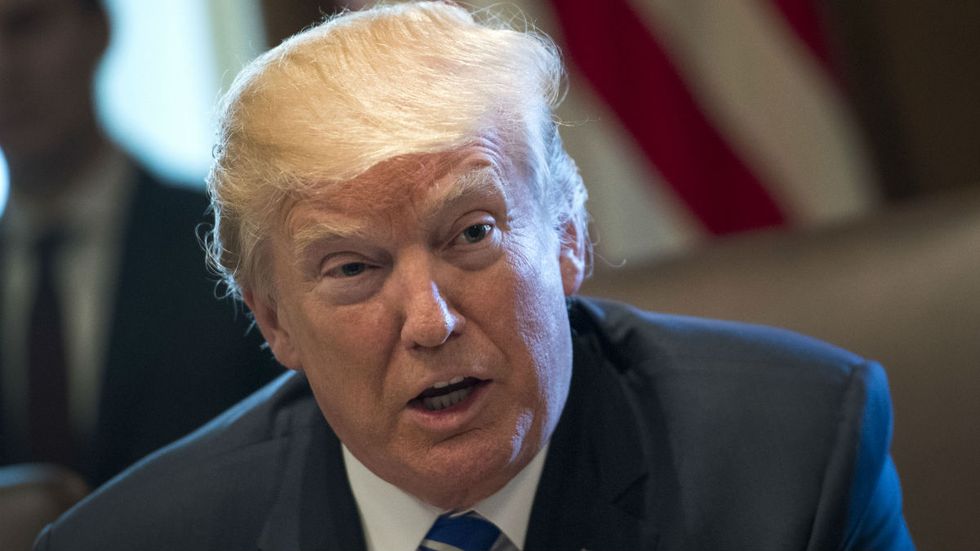
© 2024 Blaze Media LLC. All rights reserved.
Just how messed up is our system of governance? We now have a made-up but all too real fourth branch of government suing the Trump administration to obtain power it doesn’t have. And of course, as always, the final arbiter of this decision will be what was supposed to be the weakest branch of government in comparison to Congress and the executive branch: the courts.
While Richard Cordray should have been fired on day one of this administration as director of the Consumer Financial Protection Bureau (CFPB), thankfully, he decided to step down. Unfortunately, Cordray left us with a parting gift as he shut down his office computer on Friday. He defied Trump’s order to install Mick Mulvaney, the current director of the Office of Management and Budget (OMB), as acting director of the CFPB and instead ordered his deputy, Leandra English, to be the acting director. Now, English has filed a motion with the U.S. District Court of the District of Columbia for a temporary restraining order against Mulvaney serving as acting director.
CFPB employee showed me this email sent 30 min ago and signed by Leandra English, Acting Director. ???? pic.twitter.com/j7eiL5sxxJ
— Katie Rogers (@katierogers) November 27, 2017
Cordray and English contend that the Dodd-Frank law requires the president to automatically choose the deputy director as the acting director until the Senate confirms a replacement. However, the administration is clearly in the right here, as it contends that the deputy director only steps in when nobody else is appointed. In this case, the overarching law, the Federal Vacancies Act of 1998 (PL 105-227), allows the president to appoint another acting head of the agency for the duration of 210 days as long as that individual either works in the top management of the relevant agency or was already confirmed by the Senate to head another agency.
In this case, Mulvaney has already gone through the Senate confirmation process to head the OMB. It’s clear that the Left is using a specious legal argument to mask a political argument. They don’t want Mulvaney, a man who once referred to the CFPB as a “sick, sad” “joke” of an agency, to corral it into submission.
CFPB is the death panel of our economy
The CFPB is perhaps the poster child of the lawless fourth branch of government illegally created by Congress. Thus, it’s somewhat ironic that there would be a separation of powers crisis over who would lead this very agency in the event of a vacancy. This unaccountable agency operates autonomously within the Federal Reserve, which itself wrongly operates as an autonomous fourth branch, and is not subject to congressional appropriations or oversight.
The CFPB director now operates as an independent fourth branch czar over the most important aspects of financial services, including mortgages, student loans, credit cards, and all banking practices. The director wields both the “legislative” power to regulate and the enforcement power over 19 consumer-protection statutes previously handled by seven multi-member agencies. Unlike other dubiously constitutional “independent” commissions that wield much less power, the CFPB is controlled by a single director instead of a multi-member commission. That individual has the ability to legislate as a body of one over the most important economic decisions.
An American Action Forum study in 2015 estimated that all of the regulation and stagnation from the Dodd-Frank Act will cost the economy just under $1 trillion — or, over $3,300 for every working-aged person in the U.S. — from 2016 to 2025. According to another study last year, it had already cost over 73 million paperwork hours for small businesses and resulted in a 14.5 percent drop in consumer credit, further stifling economic growth and job creation.
The president controls executive personnel. Period.
There is a broader problem that is being exposed in this CFPB drama. Many statutes making limitations on the president’s power to hire and fire employees are unconstitutional. The Dodd-Frank law grants a five-year tenure to the CFPB director. If there is one power the president manifestly wields, it is the power over personnel. After all, he is the chief executive officer. As James Madison said in 1789, “[I]f any power whatsoever is in its nature Executive, it is the power of appointing, overseeing, and controlling those who execute the laws.”
Congress certainly has the most power of all three branches. Members of Congress can defund an agency, abolish an agency, or alter its statutory purview. But the one thing Congress cannot do is force upon the president any particular personnel. Once again, Madison already told us what he thought of congressional tenure laws. Madison explained the distinction in separation of powers very clearly in a letter to Thomas Jefferson (see page 196):
[Congressional tenure laws] overlook the important distinction between repealing or modifying the office and displacing the officer. The former is a legislative, the latter an Executive function; and even the former, if done with a view of re-establishing the office and letting in a new appointment, would be an indirect violation of the theory and policy of the Constitution.
Madison voiced this opinion three decades prior while he was a member of Congress, long before he became a president:
If the President should possess alone the power of removal from office, those who are employed in the execution of the law will be in their proper situation, and the chain of dependence be preserved; the lowest officers, the middle grade, and the highest, will depend, as they ought, on the President, and the President on the community.
The president has the power to appoint executive ministers and consuls (U.S. Const., Art. II, §2). From early on, the Supreme Court ruled (Ex Parte Hennen, 1839) that a president can fire anyone he chooses.
In this case, Trump can simply make this lawsuit moot by firing Leandra English from her position as deputy director, even if she would be correct in asserting that the deputy automatically becomes the acting director during a vacancy.
Moreover, although all high positions (roughly 1,000 or so appointments) require Senate confirmation for a permanent appointment, the president has full power to make recess appointments, even without the power of statute. The Constitution (Art. II, §2) states that “[t]he President shall have Power to fill up all Vacancies that may happen during the Recess of the Senate, by granting Commissions which shall expire at the End of their next Session.” While past presidents, including Barack Obama, have abused this clause to permanently appoint high officials when there was no legitimate Senate recess in order to circumvent the confirmation process, it is clear the president can fill an immediate vacancy due to a sudden resignation when he clearly intends to submit the nomination to the Senate.
Thus, constitutionally speaking, Congress can write a statute creating a line of succession as an advisory guideline, but ultimately a president has the power to fire anyone he wants and temporarily install a person of his choice pending Senate confirmation in the long run.
It’s a crying shame that along with not repealing Obamacare, Republicans have failed to repeal Dodd-Frank. Even the bill that passed the House earlier this year only reforms, but doesn’t repeal the CFPP, much less the broader law. Thus far, it hasn’t seen any action in the Senate.
The president is right to assert his executive authority over personnel choices. But overall, he should be pushing to abolish the entire agency. Then, Ms. English, along with her mentor, Sen. Elizabeth Warren, can play regulators over a nonexistent agency, along with their nonexistent version of the Constitution.
Find out what the mainstream media won't tell you about President Trump and his administration.
Sign up to get CRTV's free White House Brief delivered right to your inbox once a day.
Want to leave a tip?
We answer to you. Help keep our content free of advertisers and big tech censorship by leaving a tip today.
Want to join the conversation?
Already a subscriber?
Blaze Podcast Host
Daniel Horowitz is the host of “Conservative Review with Daniel Horowitz” and a senior editor for Blaze News.
RMConservative
more stories
Sign up for the Blaze newsletter
By signing up, you agree to our Privacy Policy and Terms of Use, and agree to receive content that may sometimes include advertisements. You may opt out at any time.
© 2024 Blaze Media LLC. All rights reserved.
Get the stories that matter most delivered directly to your inbox.
By signing up, you agree to our Privacy Policy and Terms of Use, and agree to receive content that may sometimes include advertisements. You may opt out at any time.



